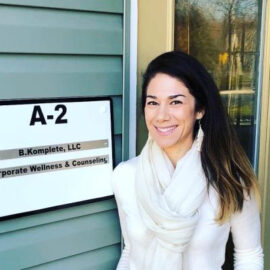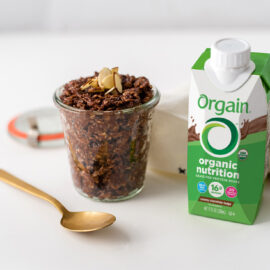Healthcare professionals are vital partners in the advancement of environmental health and can make a positive impact by providing much-needed education to their patients and clients on ways to support the planet. This month we’re excited to share resources and information to help empower you to incorporate eco-friendly recommendations into counseling.
Food + Planet
This month’s podcast guest, Kate Geagan, MS, RD, is a Co-Founder of Food + Planet, an organization sharing educational resources to empower healthcare professionals to support sustainable food systems and be leaders in sustainable nutrition education.
According to Kate, “Healthcare professionals can play a leading role in providing sustainable diet guidance in ways that easily fit their clients’ health goals, cultural food preferences and budget. Sharing specific local resources can help empower patients or clients to support a more resilient, sustainable food system -such as In Season produce guides, local Community Supported Agriculture (CSA) or farmers market information (including those aligned with the Supplemental Nutrition Assistance Program (SNAP), or spotlighting community-let brands or companies who are generating solutions from within the community. And showcasing “hero” sustainability ingredients in programs such as culinary demos, tastings, recipes, blogs or social media posts can bring this to life for your community in ways that feel right to your authentic voice. For example, this could be more biodiverse or traditional foods, underutilized or heirloom species, or even edible portions of ingredients that can often be cast off as food waste (i.e. beet leaves, broccoli stems or carrot top greens).”
Get started by visiting foodandplanet.org/downloads now and downloading the guide, Empowering Nutrition Professionals to Advance Sustainable Food Systems.
Intersection of Human and Planetary Health
Check out the article below from Food & Nutrition magazine, featuring quotes from integrative dietitian and host of The Good Clean Nutrition Podcast, Mary Purdy, MS, RDN.
Tips for Healthcare Professionals to Share with Patients
The United Nations 2030 Sustainable Development Goals set a Decade of Action guideline for urgent solutions for health, the climate, energy, and natural resources.1 The health of the planet depends on support from healthcare professionals to spread the word about ways transform our food use. It’s critical to listen to patients’ values and beliefs about food and integrate culturally sensitive, meaningful food options. Healthcare professionals are well-positioned to provide solutions to protect and maintain the food supply with these tips:
- Cook more meals at home to help reduce food waste and increase consumption of healthful foods. Consider using an app for shopping and meal planning. When eating out, plan meals accordingly to use food at home before it perishes.
- Buy what you need, use what you buy, and participate in home-based composting of inedible food scraps. Reiterate that composting is not the first step to manage food waste, buying responsibly is the best way to help the planet.
- Keep food fresh for as long as possible. Wait to wash berries until they are served since moisture shortens their shelf life, use air-tight containers for opened packages of food and store food properly in the refrigerator, e.g., don’t store dairy on the refrigerator door as it can be warmer, and keep vegetables in the crisper drawer.
- Try to reduce meat consumption by 25 percent. For example, for those averaging 8 meat-based meals per week, swap in at least 2 plant-based meals.
- When possible, choose eco-friendly packaging, recycle food packaging, remove leftover food prior to recycling and know what items are eligible for recycling.
- Promote the healthfulness of “ugly” or imperfect produce.
- Encourage use of frozen, dried and canned food items as they have a longer shelf life and are linked to less waste. Provide simple, tasty recipes for using these items to capture consumer interest.
- Clear your shelves regularly and donate unopened, unexpired food items to your food bank.
1 United Nations Sustainable Development Goals. Decade of Action. Available at: https://www.un.org/sustainabledevelopment/decade-of-action/#:~:text=2020%20needs%20to%20usher%20in,and%20closing%20the%20finance%20gap. Accessed 3/10/2022



